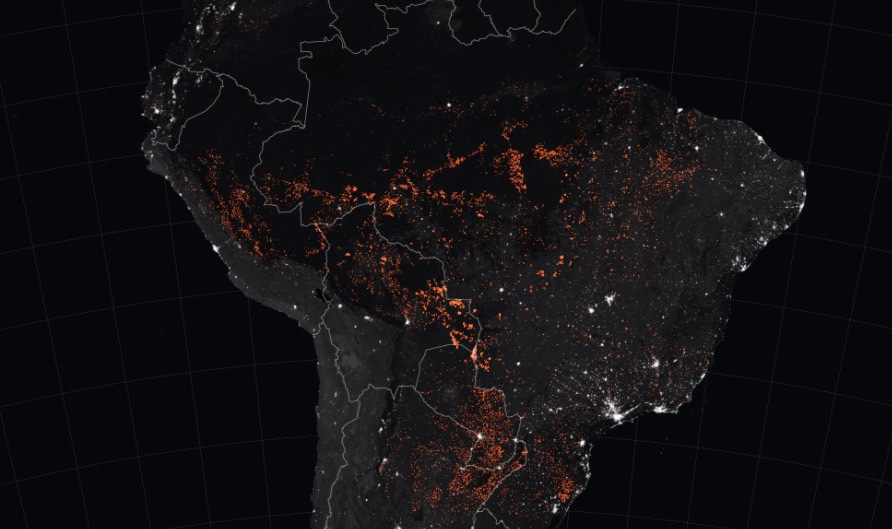Europe's beef with Latin America trade deal now includes Amazon wildfires
Mercosur deal has no Paris Agreement provisions, stirring concern about Bolsonaro's Amazon deforestation

Above, NASA satellites recorded thousands of points of fire in the Amazon rainforest last year.
(Stephen Rae is the former Group Chief Editor of INM, Ireland’s largest online and print media group. He serves on the board of the World Association of News Publishers (WAN-IFRA) and was previously on the board of the World Editors Forum. He was appointed by the European Commission to its High Level Expert Group on Online Disinformation.)
DUBLIN (Callaway Climate Insights) — Environmental concerns could yet torpedo a mammoth trade deal between Europe and Latin America that has been two decades in the making.
The Mercosur trade deal has always been problematic — primarily for the EU’s powerful agricultural sector who worry about cheap beef pumped full of growth hormones being sold in the bloc’s supermarkets, undermining local producers.
Now, increasingly, EU countries opposed to the Mercosur trade deal see the rapid deforestation of the Amazon basin as an even bigger issue with the deal. After all, in many cases trees are being cut to make way for grazing land for Brazil’s cattle ranchers. It is also safe to say that Brazilian President Jair Bolsonaro is the not exactly the most revered politico in the liberal stronghold that is the European Commission’s Berlaymont, Brussels headquarters.
What makes matters even trickier for the Latin American (Brazil, Argentina, Paraguay and Uruguay) negotiators is that a leaked copy of the EU-Mercosur negotiation text now reveals it has no provisions to ensure the Paris climate agreement is enforced.
While Germany — which currently holds the revolving EU presidency — is anxious to get the treaty ratified, France is now insisting conditions be inserted to ensure it does not lead to further Amazon deforestation.
“The draft agreement has no provision to impose discipline on the practices of the Mercosur countries in the fight against deforestation,” the French government said in a statement last month.
“This is the major shortcoming in this agreement and this is the main reason why, as it stands, France opposes the draft agreement,” it added.
Other problems with the draft treaty include a lack of democratic accountability, with national parliaments and the European parliament excluded from decision-making bodies appointed to oversee the enforcement of the deal.
All this is taking place as the Brazilian government is increasingly seen as an international climate pariah. Just this month, Formula One champion Lewis Hamilton opposed plans to hold the Brazilian Grand Prix at a new track in Rio De Janeiro to be built on land that is currently forest.
Six-time world champion Hamilton said: “I heard it is potentially going to be a sustainable race. “But the most sustainable thing you can do is not tear down any trees.”
He added: “I don’t think it’s a smart move. There is a global crisis with deforestation.”
The so-called Deodoro project, which involves building in the Camboata Forest, has been backed by Bolsonaro, whose actions as president have sparked opposition from environmental groups, particularly what they say is his failure to prevent fires in the Amazon — many started deliberately to create farmland.
Bolsonaro has described the criticisms as “disproportionate.”
Many European leaders oppose the Mercosur deal, including Ireland’s prime minister Leo Varadkar, who knows it could devastate Ireland’s organic beef market. What a victory it would be for the EU if the bloc could do a deal that also saved the Amazon.





